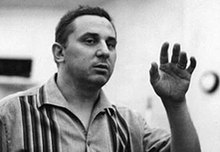American musician (1925–1995) From Wikipedia, the free encyclopedia
Martin Louis Paich (January 23, 1925 – August 12, 1995)[1] was an American pianist, composer, arranger, record producer, music director, and conductor. As a musician and arranger he worked with jazz musicians Peggy Lee, Ella Fitzgerald, Stan Kenton, Al Hirt, Art Pepper, Buddy Rich, Ray Brown, Shorty Rogers, Pete Rugolo, Ray Charles and Mel Tormé. His long association with Tormé included one of the singer's earliest albums, Mel Tormé with the Marty Paich Dek-Tette. Over the next three decades he worked with pop singers such as Andy Williams and Jack Jones and for film and television. He is the father of David Paich, a founding member of the rock band Toto.
Marty Paich | |
|---|---|
 | |
| Background information | |
| Birth name | Martin Louis Paich |
| Born | 23 January 1925 Oakland, California, U.S. |
| Died | 12 August 1995 (aged 70) Santa Ynez, California, U.S. |
| Genres | Jazz, pop, rock |
| Occupation(s) | Musician, arranger, composer, conductor, record producer |
| Instrument | Piano |
| Years active | 1950s–1990s |
| Website | martypaich |
A native of Oakland, California, Paich learned accordion and piano at an early age.[2] In the 1930s, when he was ten years old, he was leading bands and performing at weddings.[2] At sixteen, he wrote arrangements with Pete Rugolo.[3] He served with the U.S. Air Corps in World War II.[2][4] He attended the University of Southern California and received a master's degree in composition from the Los Angeles Conservatory of Music.[2][3] Among his teachers were Julia Bal de Zuniga,[5] Mario Castelnuovo-Tedesco,[3][6] and Arnold Schoenberg.[2]
In the 1950s, in addition to working as music director for Peggy Lee, he wrote arrangements for Chet Baker, Ray Brown, Stan Kenton, Shelly Manne, Dave Pell, Buddy Rich, Shorty Rogers, Mahalia Jackson, and for the movie Lady and the Tramp.[3][7] He began recording with Mel Tormé in 1955 on the album It's a Blue World when Tormé was moving from pop singer to jazz singer.[8] During the next year, his ten piece band accompanied Tormé on the album Mel Tormé with the Marty Paich Dek-Tette, which contained a version of the 1930s song "Lulu's Back in Town".[3][8] He wrote arrangements for Art Pepper for the album Art Pepper + Eleven – Modern Jazz Classics.[3]
In the 1960s, he spent less time as a musician and more as an arranger for pop singers such as Sammy Davis Jr., Dean Martin, Barbra Streisand, Andy Williams,[3] Dinah Shore, and Jack Jones.[2]
He also scored films, such as Hey There, It's Yogi Bear! (1964), The Man Called Flintstone (1966), The Swinger (1966) and Changes (1969).
In the 1970s, he worked as a composer and arranger in film and television, winning an Emmy award for the television drama Ironside.[3] He led the studio orchestras for television variety programs such as The Glen Campbell Goodtime Hour and The Smothers Brothers Comedy Hour[3] and replaced Nelson Riddle in The Sonny & Cher Comedy Hour.[9]
Marty orchestrated and conducted scores for the films The Fugitive, Pretty Woman, and Prince of Tides.[10]
Paich died of colon cancer at the age of 70 on August 12, 1995[3] at his home in Santa Ynez, California.[11]
With Dave Pell
With Johnny Rivers
With Mel Tormé
With others
Seamless Wikipedia browsing. On steroids.